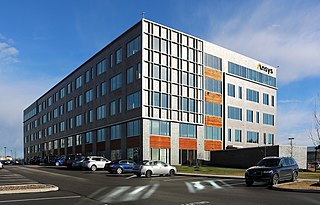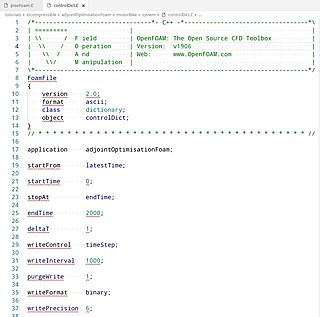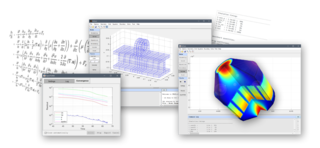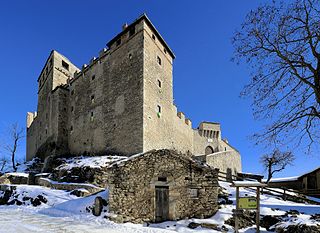
Computational fluid dynamics (CFD) is a branch of fluid mechanics that uses numerical analysis and data structures to analyze and solve problems that involve fluid flows. Computers are used to perform the calculations required to simulate the free-stream flow of the fluid, and the interaction of the fluid with surfaces defined by boundary conditions. With high-speed supercomputers, better solutions can be achieved, and are often required to solve the largest and most complex problems. Ongoing research yields software that improves the accuracy and speed of complex simulation scenarios such as transonic or turbulent flows. Initial validation of such software is typically performed using experimental apparatus such as wind tunnels. In addition, previously performed analytical or empirical analysis of a particular problem can be used for comparison. A final validation is often performed using full-scale testing, such as flight tests.
Pilot licensing or certification refers to permits on how to operate aircraft that are issued by the Civil Aviation Authority (CAA) in each country, establishing that the holder has met a specific set of knowledge and experience requirements. This includes taking a flying test. The certified pilot can then exercise a specific set of privileges in that nation's airspace. Despite attempts to harmonize the requirements between nations, the differences in certification practices and standards from place to place serve to limit full international validity of the national qualifications. In addition, U.S. pilots are certified, not licensed, although the word license is still commonly used informally. Legally, pilot certificates can be revoked by administrative action, whereas licensing requires intervention by the judiciary system.

Ansys Inc. is an American public company based in Canonsburg, Pennsylvania. It develops and markets engineering simulation software. Ansys software is used to design products and semiconductors, as well as to create simulations that test a product's durability, temperature distribution, fluid movements, and electromagnetic properties.

Tecplot is the name of a family of visualization & analysis software tools developed by Tecplot, Inc., which is headquartered in Bellevue, Washington. The firm was formerly operated as Amtec Engineering. In 2016, the firm was acquired by Vela Software, an operating group of Constellation Software, Inc. (TSX:CSU).

Fluid–structure interaction (FSI) is the interaction of some movable or deformable structure with an internal or surrounding fluid flow. Fluid–structure interactions can be stable or oscillatory. In oscillatory interactions, the strain induced in the solid structure causes it to move such that the source of strain is reduced, and the structure returns to its former state only for the process to repeat.

OpenFOAM is a C++ toolbox for the development of customized numerical solvers, and pre-/post-processing utilities for the solution of continuum mechanics problems, most prominently including computational fluid dynamics (CFD).
Exa Corporation is a developer and distributor of computer-aided engineering (CAE) software. Its main product is PowerFLOW, a lattice-boltzmann derived implementation of computational fluid dynamics (CFD), which can very accurately simulate internal and external flows in low-Mach regimes. PowerFLOW is used extensively in the international automotive and transportation industries.
Dudley Brian Spalding, FRS FREng was Professor of Heat Transfer and Head of the Computational Fluid Dynamics Unit at Imperial College, London. He was one of the founders of computational fluid dynamics (CFD) and an internationally recognized contributor to the fields of heat transfer, fluid mechanics and combustion. He created the practice of CFD – its application to problems of interest to engineers. Most of today’s commercially available CFD software tools trace their origin to the work done by Spalding's group in the decade spanning the mid-60s and mid-70s. Spalding became a Fellow of the Royal Society and Fellow of the Royal Academy of Engineering.

Charbel Farhat is the Vivian Church Hoff Professor of Aircraft Structures in the School of Engineering at Stanford University, where he is also Chairman of the Department of Aeronautics and Astronautics, Professor of Mechanical Engineering, Professor in the Institute for Computational and Mathematical Engineering, Director of the Army High Performance Computing Research Center, and Director of the King Abdulaziz City of Science and Technology Center of Excellence for Aeronautics and Astronautics. He also serves on the United States Air Force Scientific Advisory Board (SAB), and on the Space Technology Industry-Government-University Roundtable. He has previously served on the technical assessment boards of several national and international research councils and foundations, and on the United States Bureau of Industry and Security's Emerging Technology and Research Advisory Committee (ETRAC) at the United States Department of Commerce.

CD-adapco was a multinational computer software company that authors and distributes applications used for computer-aided engineering, best known for its computational fluid dynamics (CFD) products.
Francis Harvey Harlow was an American theoretical physicist known for his work in the field of fluid dynamics. He was a researcher at Los Alamos National Laboratory, Los Alamos, New Mexico. Harlow is credited with establishing the science of computational fluid dynamics (CFD) as an important discipline.

The BRM Aero Bristell NG 5 is a Czech low-wing, two-seat in side-by-side configuration, single engine in tractor configuration, ultralight and light-sport aircraft that was designed by Milan Bristela and is produced by BRM Aero. The aircraft is supplied as a complete ready-to-fly aircraft.
"G. Paolucci" Airport is an italian airport located in 'I Piani' in Pavullo, about 2 km south of Pavullo nel Frignano, Italy. The airport is used for general aviation, business aviation, leisure and sport aviation activities, and for civil protection and rescue functions. Inside there is both a flight school for piloting gliders, and a motorized flight school for VDS equipment, basic and advanced, with the possibility of making preparatory flights to the teaching activity.

Gerris is computer software in the field of computational fluid dynamics (CFD). Gerris was released as free and open-source software, subject to the requirements of the GNU General Public License (GPL), version 2 or any later.
Vivek Vinayak Ranade is an Indian chemical engineer, entrepreneur and a professor of chemical engineering at the School of Chemistry and Chemical Engineering of the Queen's University, Belfast. He is a former chair professor and deputy director of the National Chemical Laboratory, Pune. He is known for his work on bubble column, stirred and trickle-bed reactors and is an elected fellow of the Indian Academy of Sciences, Indian National Science Academy. and the Indian National Academy of Engineering. The Council of Scientific and Industrial Research, the apex agency of the Government of India for scientific research, awarded him the Shanti Swarup Bhatnagar Prize for Science and Technology, one of the highest Indian science awards for his contributions to Engineering Sciences in 2004.

FEATool Multiphysics is a physics, finite element analysis (FEA), and PDE simulation toolbox. FEATool Multiphysics features the ability to model fully coupled heat transfer, fluid dynamics, chemical engineering, structural mechanics, fluid-structure interaction (FSI), electromagnetics, as well as user-defined and custom PDE problems in 1D, 2D (axisymmetry), or 3D, all within a simple graphical user interface (GUI) or optionally as convenient script files. Having specifically been designed to have a low learning curve and to be able to be used without requiring reading documentation, FEATool has been employed and used in academic research, teaching, and industrial engineering simulation contexts.
Harvey Ivor Rosten was an English physicist of London University and Cambridge University.

Nedjib (Ned) Djilali is a Canadian engineering professor and researcher specializing in sustainable energy and thermofluid sciences. He holds the Canada Research Chair in Advanced Energy Systems Design and Computational Modelling at the University of Victoria. Djilali is a Highly Cited Researcher, and a fellow of both the Canadian Academy of Engineering (2010) and the Royal Society of Canada (2013).


















